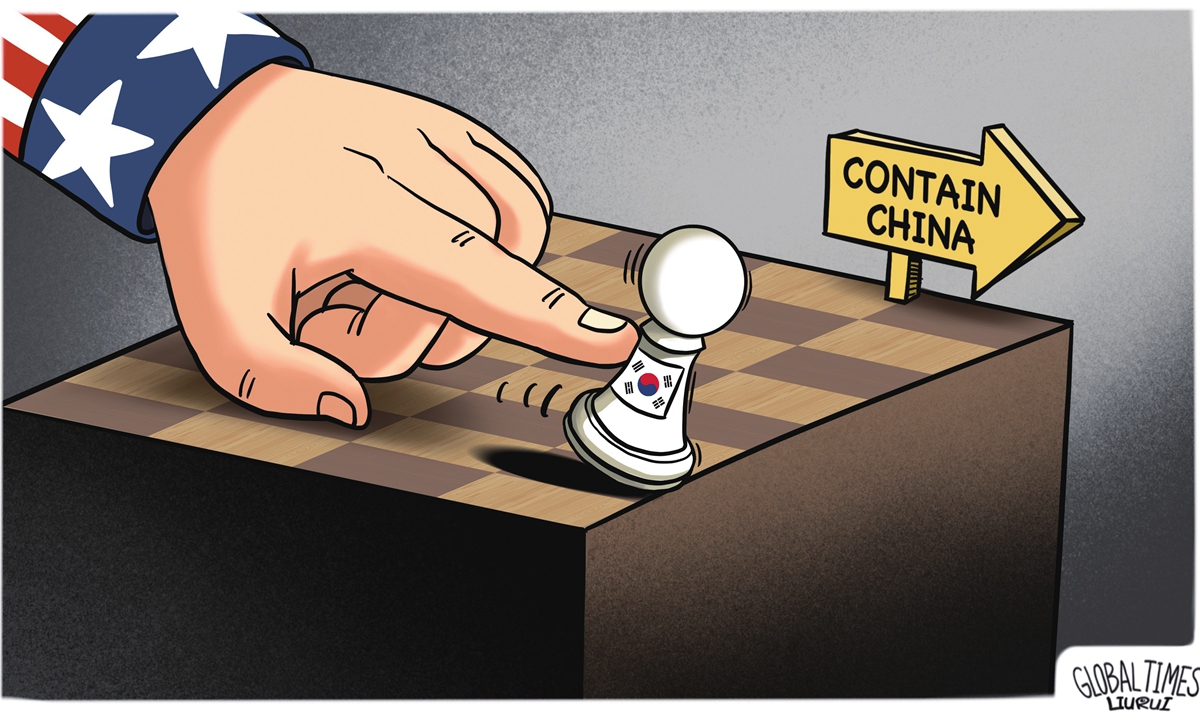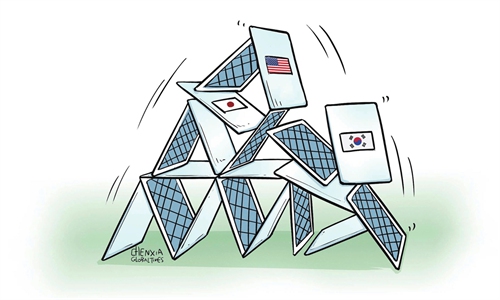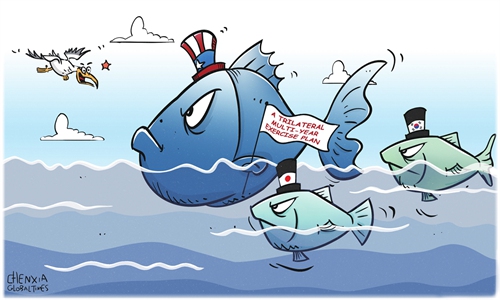
Illustration: Liu Rui/GT
Proud South Korea, which has been yearning for a spot in the Group of Seven (G7), is not invited to this year's G7 summit set for June in Italy.
In a press release late Saturday, the South Korean presidential office said countries are invited to G7 meetings based on the theme, and the key theme of the G7 discussions this year was issues concerning Africa and the Mediterranean region. Sounds like a hard attempt to cover up the embarrassment. But the country's opposition party ripped off the fig leaf. The Democratic Party of Korea said Sunday that the current administration's foreign policies - strengthening its solidarity with Western countries at the expense of relations with China - have led to the result.
South Korean President Yoon Suk-yeol has a vision to establish Korea as a "global hub country" and boost his country's strategic position by bolstering network ties with like-minded countries. For G7 summit this year, it is reported that Korean government was in consultation with Italy over the potential participation as it has been pushing for a "G7 Plus" initiative. Not being invited is hence a solid blow to South Korea's diplomatic direction and self-assessment. This result proves that South Korea is not as important in the eyes of the West as Seoul may have thought.
Moon Jae-in, former president of South Korea, was invited to the G7 summits in 2020 and 2021. In May last year, Yoon was invited to join the summit in Hiroshima, Japan. From about that time, voices have been bubbling more often about Seoul's G8 dream. According to Korea JoongAng Daily, Yoo Sang-bum, a lawmaker for South Korea's ruling People Power Party, said in May last year that South Korea has psychologically joined the G8. In the same month, VOA Korea quoted South Korean Foreign Minister Park Jin as saying South Korea is fully qualified to become a G8 country.
Against this backdrop, one can imagine how big the punch is this no-G7-invitation to the Yoon administration's G7 Plus effort.
Zhan Debin, director and professor of the Center for Korean Peninsula Studies at the Shanghai University of International Business and Economics, told the Global Times that although G7 Plus is not set in stone, and the "Plus" is fluid and changing, South Korean opposition party tend to believe Moon was invited to the summit because of his value, and Yoon was invited thanks to the influence of the previous government. So when Yoon failed to secure an invitation even after so much diplomatic effort, it is the raw failure of the Yoon administration. After all, being snubbed by the G7 is not the only diplomatic setback South Korea has faced recently, the country also failed World Expo Bid late last year.
Some analysts say Japan is the biggest stumbling block on South Korea's way of joining G7 given their territorial disputes, historical grievances, trade frictions and more importantly, Japan is unwilling to see its own status as the only Asian country in the group being challenged, or having Seoul dilute Tokyo's influence in the US-led circles.
The US, on the other hand, has little sincerity to invite South Korea to the group as well. It needs South Korea's money, resources and stance to maintain hegemony. But it also knows too well how to make Seoul and Tokyo compete for US' attention.
This time, South Korea's G8 dream has shattered, but the embarrassing movement is supposed to serve as a wake-up call from Seoul's past misconceptions.
South Korea has always viewed Western countries as advanced powers, hoping to join those exclusive circles to demonstrate its own status. This is a manifestation of South Korea's inferiority complex. It has missed the fact that the West means only a small number of countries in the world, while the majority group, represented by BRICS, is on the rise, Zhan told the Global Times.
It also missed the fact that in geopolitics, if one is just a pure follower, it does not exist.
Zhan said the G7 episode shows that many Western countries do not take South Korea seriously, it is South Korea itself who tends to overestimate its own influence. In many global issues, South Korea has no say. It is only needed by Western countries to foot the bill.
In the past, South Korea was wooed by the G7 only because of its friendly relationship with China, which gave Seoul a higher strategic value. Now that South Korea has fully aligned with the West, proactively positioning itself against China, it is thus no longer needed by the West to make much effort to court it, Zhan added.
Yet Yoon has not figured it out. If South Korea truly wants genuine respect from the world, its efforts should not be focused on the G7, but rather on stopping following the US blindly in the latter's confrontation against China, and making mature decisions for the benefit of South Korea. It needs a solid spine to become a global hub country.


